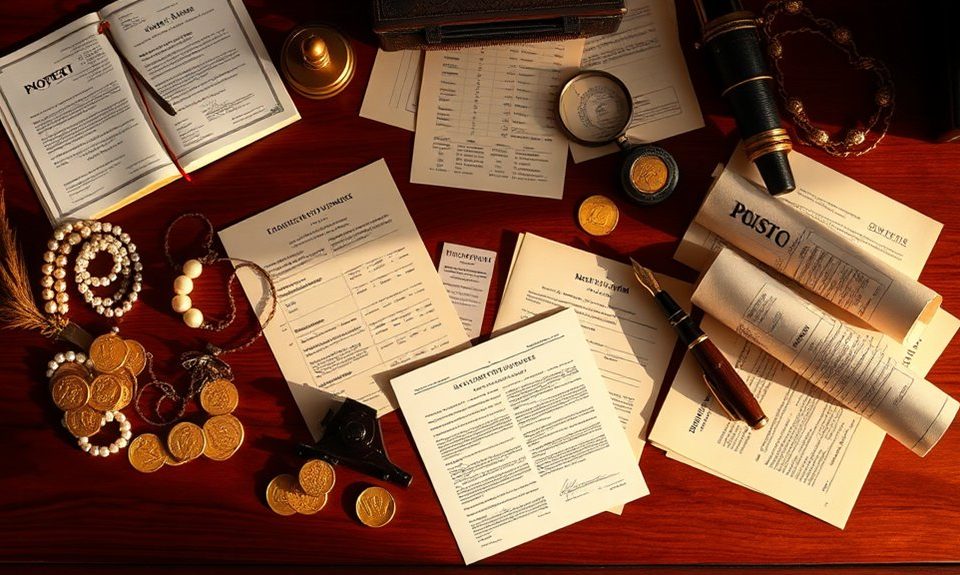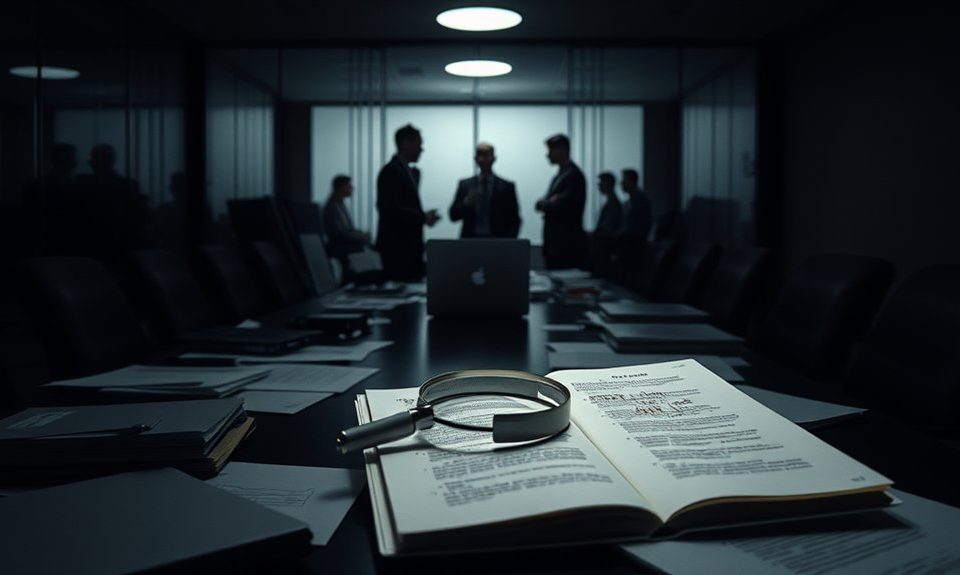In today’s complex business landscape, corporate integrity is of utmost importance. Companies encounter various challenges, such as financial irregularities, employee misconduct, intellectual property theft, and security breaches. Understanding when to hire a corporate investigator or a private investigator can be crucial for protecting assets, mitigating reputational damage, and maintaining a strong reputation. This article outlines the signs that indicate your company may need professional investigative assistance, the benefits of hiring an investigator, and tips for selecting the right specialist, such as OpSec Solutions or Kreller Group, for your specific situation. Read this article to help ensure your business remains secure and compliant.
Key Takeaways:
What is a Corporate Investigator?
A corporate investigator is a professional who examines organizations to identify illegal or unethical activities and ensure compliance with laws and data regulations. They investigate financial irregularities, employee misconduct, potential data breaches, cybersecurity threats, and other risks that could harm an organization’s assets and reputation.
Corporate investigators utilize specialized tools and methodologies, such as GPS tracking and geofencing, and possess extensive knowledge of risk assessments, organizational structures, employee behavior, and compliance legislation. They often collaborate closely with compliance officers, third parties, and corporate policies to help organizations uphold ethical and legal standards of behavior and security protocols.
Corporate investigators can be hired either internally or externally for their expertise and work within proprietary or private investigations and corporate risk management. Their role includes assisting organizations in conducting internal audits, protecting assets, maintaining the integrity of processes, conducting internal investigations, and mitigating reputational damage while adhering to legal requirements.
Why Companies May Need One
Companies often require the services of a corporate investigator to prevent reputational damage resulting from financial irregularities and employee misconduct, ensure compliance with legislation, including compliance legislation, and guarantee security.
In cases of financial audits that could lead to significant fines, legal action, or lawsuits, a thorough investigation can clarify the situation and protect the organization.
Compliance checks, which ensure adherence to proper industry standards, often necessitate an independent investigation of internal procedures to determine whether they have been followed. This can help in identifying potential compliance issues and ensuring adherence to data regulations.
A corporate investigator is essential when there are suspicions of wrongdoing in the workplace, as they can help uncover the truth and mitigate potential damage.
Failing to utilize their services could lead not only to financial losses but also to irreparable harm to the organization’s reputation and trustworthiness in the marketplace.
Signs Your Company May Need a Corporate Investigator
Indications that a company may require the services of a corporate investigator include financial irregularities, employee misconduct, security breaches, regulatory and compliance issues, unauthorized use, as well as intellectual property theft or vendor fraud.
These signs can signify a serious threat to the company’s operational integrity.
Financial Irregularities
Financial irregularities encompass a range of issues, from embezzlement to financial fraud, and identifying them is essential for corporate investigations to comply with legislative requirements and maintain effective risk management.
These irregularities may manifest as accounting errors, intentional recording of fictitious or misleading revenues, accounting irregularities, or manipulation of financial statements, all of which can significantly impair an organization’s credibility and financial stability.
If not addressed promptly, these issues can lead to costly legal actions, erode stakeholder trust, and ultimately jeopardize the organization’s viability.
To effectively tackle these challenges, corporate investigators must uncover irregularities through comprehensive audits and forensic accounting.
By utilizing advanced analytical tools and techniques, investigators can identify these previously concealed problems, enabling companies to implement corrective actions swiftly to mitigate potential harm.
Employee Misconduct
Employee misconduct—whether it involves workplace violence, negligent behavior, or breaches of company policy—necessitates the involvement of a private investigator to ensure workplace safety and uphold compliance with legislation within the broader organizational framework.
Such behavior not only undermines the integrity of the workplace but can also lead to significant financial and reputational damage for the organization. When misconduct is allowed to persist, it fosters a toxic work environment that negatively affects employee morale, retention, and productivity.
Thoroughly investigating these behaviors is essential to determine if there are larger systemic issues at play, such as industrial espionage, and to identify the necessary steps for rectification.
Intellectual Property Theft
Intellectual property theft poses a significant risk to organizations, representing the unauthorized use of proprietary knowledge, personal information, and information. This form of theft can undermine a company’s competitive edge, making corporate investigations essential for implementing effective security protocols and compliance with legislation.
Such unethical practices not only erode innovation but also lead to substantial financial losses and tarnished reputations. Organizations invest heavily in developing their unique products and services, and when these investments are compromised through theft, the repercussions can affect the entire industry.
Corporate investigators play a crucial role in distinguishing between lawful and illegal business practices, including detecting insurance fraud and business partnerships that may jeopardize corporate integrity. By conducting evaluations and audits, they can identify areas of concern and ensure adherence to vital security measures.
Establishing and maintaining stringent security protocols is critical for protecting organizations from the detrimental effects of intellectual property theft and ensuring their long-term viability.
Compliance Issues
Compliance issues refer to the challenges organizations face in adhering to the regulations and laws that govern specific corporate functions, and these can significantly impact technology impact on compliance. These issues can be effectively addressed through corporate investigations that mitigate the risk of compliance failures and ensure that employees follow established data regulations.
In today’s world, where regulatory scrutiny is stringent and stakeholder expectations are heightened, compliance in corporations is more crucial than ever. Organizations that fail to meet compliance standards risk facing severe penalties, including fines, lawsuits, and reputational damage that can jeopardize their market viability.
As data privacy and security become increasingly prioritized, compliance is not only a legal obligation but also a moral imperative that fosters customer trust. Corporate investigators play a vital role in addressing compliance failures by conducting audits, performing corporate risk assessments, implementing remedial actions, and establishing mechanisms to prevent future compliance breaches.
This approach not only enables organizations to rectify compliance issues but also promotes a culture of accountability and responsibility within the corporate environment. Organizations like the Association of British Investigators, Institute of Professional Investigators, and U.K Professional Investigators Network provide guidelines and best practices.
Competitor Intelligence
Competitor intelligence involves the collection and analysis of data about rival companies, and when conducted ethically, it yields valuable insights into competitive intelligence. Corporate investigations, including corporate investigations for competitive intelligence, may be necessary to detect improper practices and potential vendor fraud that can compromise corporate integrity.
This intelligence can help identify market trends, highlight areas for improvement, and guide companies in refining their strategies to stay ahead of competitors.
However, as organizations engage in this knowledge-gathering process, it is crucial to adhere to ethical standards to ensure that actions do not invade privacy or employ illegal tactics, such as industrial espionage. When unethical behaviors, such as corporate espionage, come to light, it is the responsibility of corporate investigators to uncover the facts and protect the interests of ethical corporations, thereby maintaining a level playing field for all.
Benefits of Hiring a Corporate Investigator
Hiring a corporate investigator offers several benefits, including:
- Protection of company assets from fraud and theft
- Ensuring compliance with legal regulations
- Safeguarding the organization’s reputation through thorough investigations and effective risk management strategies
Protecting Company Assets
One of the primary benefits of hiring a corporate investigator is the protection of assets from financial irregularities, fraud, embezzlement, and other threats through comprehensive corporate investigations and effective risk management practices.
These investigators employ a variety of techniques to ensure the financial integrity of a company. They implement thorough auditing practices by meticulously examining financial statements and transactions to identify inconsistencies that may suggest fraudulent activities.
Additionally, they utilize advanced fraud detection methods, including data analytics, behavioral analysis, and corporate risk management practices, to uncover trends that could indicate illegal activities.
Corporate investigators and private investigators play a vital role in safeguarding businesses from potential internal and external risks through vigilance, risk management, and regular compliance checks. They ensure that security protocols are followed and any unauthorized use of company resources is detected early.
Ensuring Legal Compliance
Corporate investigators play a crucial role in ensuring legal compliance by conducting investigations that adhere to compliance legislation, data regulations, and security standards, thereby minimizing the risk of legal action against the organization. Their expertise in corporate investigations is invaluable in maintaining legal and ethical standards.
They identify potential areas of regulatory violation and assess internal controls designed to safeguard the organization’s assets. By employing forensic methodologies, they meticulously review financial activities, financial irregularities, employee behavior, and operational procedures to ensure adherence to laws and standards. They also keep an eye on any suspicious activities that could threaten the organization.
Additionally, they promote best practices, such as employee training on security protocols and regular audits, to reinforce a culture of compliance. Their work not only helps the organization avoid financial risks, including embezzlement and vendor fraud, but also protects its reputation in the marketplace, making their contributions essential for the organization’s long-term sustainability. They also help in managing relationships with third parties and business partnerships.
Preserving Reputation
Maintaining a company’s reputation is crucial, and engaging a corporate investigator can assist in mitigating reputational damage by addressing potential issues proactively and ensuring compliance with relevant legislation. They are also adept at managing reputational issues arising from industrial espionage, insurance fraud, and competitive intelligence.
This approach not only helps organizations identify possible threats before they escalate into widespread crises but also promotes a culture of transparency and accountability within the business.
For example, when a company suspects employee misconduct, conducting a thorough investigation can uncover the facts and enable leadership to make informed decisions, thereby preventing rumors and speculation.
Similarly, if a competitor spreads false information, a timely corporate investigation can gather essential evidence to effectively counteract these claims, protecting the brand’s integrity in the marketplace. This can also help in managing cases of intellectual property theft and industrial espionage.
In these scenarios, corporate investigations prove to be a vital tool for maintaining trust among stakeholders and clients alike. Corporate risk management is essential in these investigations to ensure that all aspects of the company’s operations are secure.
How to Choose the Right Corporate Investigator
Choosing the right corporate investigator necessitates careful consideration of their relevant experience and expertise, their reputation within the industry, as well as their pricing structures and commitment to confidentiality. Organizations like the Association of British Investigators, Institute of Professional Investigators, U.K Professional Investigators Network, and firms like OpSec Solutions and Kreller Group can be valuable resources in finding the right investigator.
Experience and Expertise
The experience and expertise of a corporate investigator are essential, particularly in conducting internal investigations related to financial irregularities, accounting irregularities, and compliance issues. Their ability to handle sensitive data breaches and cybersecurity threats is also crucial.
These professionals typically hold degrees in forensic accounting, law, or corporate compliance, which equip them to navigate complex regulations and standards governing financial and operational performance.
Their skills in evidence gathering and analysis, combined with a solid understanding of corporate psychology and organizational structure, make them vital for maintaining an organization’s reputational integrity. They also use advanced technology impact tools such as GPS tracking and geofencing to aid their investigations.
When hiring a corporate investigator, it is important to seek individuals with a track record of successful investigations, especially in high-stakes environments. Experience with relevant technologies and methodologies, including managing security breaches and personal information protection, is also crucial.
These qualities not only enhance the investigative process but also foster an environment of accountability and adherence to ethical standards within the corporation. They help in preventing workplace violence and other internal threats, thereby ensuring a safer workplace.
Cost and Confidentiality
When hiring a corporate investigator, two key factors to consider are the cost of their services and the confidentiality they offer.
The costs associated with corporate investigator services can vary significantly based on the complexity of the investigation, its duration, and the specific services required. These costs may include expenses for investigating vendor fraud, competitive intelligence, and ensuring compliance with security protocols. Typical costs may include:
- the investigator’s hourly or project rate
- retainer fees
- expenses for special tools or additional resources
Other potential fees can include travel expenses, administrative costs, or charges for expert witnesses if the investigation leads to a legal case.
Confidentiality is crucial throughout the investigation process, as it safeguards sensitive information and fosters trust between businesses and investigative agencies. Selecting a corporate investigator agency that prioritizes discretion can help protect a business’s reputation while still delivering thorough and effective investigative results.
Frequently Asked Questions
1. What are the top 5 signs that my company needs a corporate investigator?
The top 5 signs that your company may need a corporate investigator include: financial discrepancies, employee misconduct, intellectual property theft, security breaches, and suspicious activity.
2. How can a corporate investigator help with financial discrepancies in my company?
A corporate investigator can conduct thorough investigations into financial discrepancies, including embezzlement, fraud, and accounting errors, to identify the source of the issue and provide evidence for legal action if necessary.
3. Are there any red flags that indicate employee misconduct and warrant hiring a corporate investigator?
Yes, signs of employee misconduct such as excessive absences, unexplained changes in behavior, and complaints from other employees can indicate the need for a corporate investigator to uncover any unethical or illegal activities.
4. Can a corporate investigator assist with cases of intellectual property theft?
Yes, a corporate investigator can gather evidence and conduct thorough investigations to identify any instances of intellectual property theft and help protect your company’s valuable assets.
5. How can hiring a corporate investigator help prevent security breaches in my company?
A corporate investigator can perform security audits, implement security measures, and train employees on security protocols to prevent potential breaches and protect your company’s sensitive information.
6. What types of suspicious activity should a corporate investigator be on the lookout for?
A corporate investigator should be aware of any unusual or unauthorized activities such as changes in employee behavior, abnormal financial transactions, data breaches, and unexplained data breaches, which could indicate potential threats to your company.
A corporate investigator should be aware of any unusual or unauthorized activities such as changes in employee behavior, abnormal financial transactions, and unexplained data breaches, which could indicate potential threats to your company.






